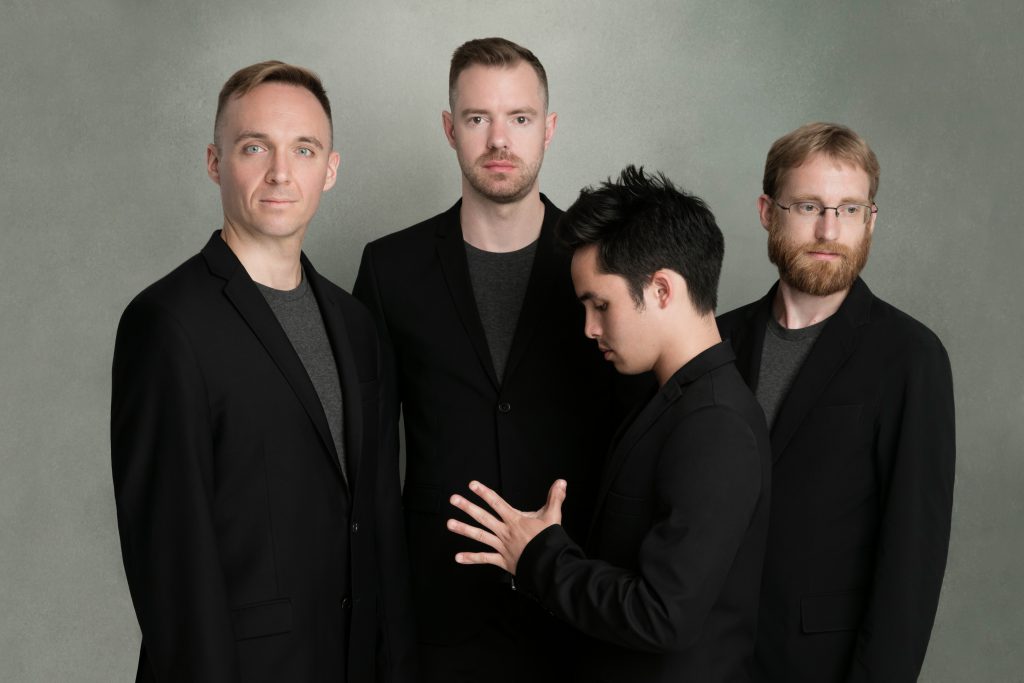Ligeti past is prologue for JACK Quartet’s program of new music

JACK Quartet performed Friday night at 92Y. Photo: Beowulf Sheehan
Contemporary classical composition is going in so many different directions, that the surprise of JACK Quartet’s Friday night concert at 92Y was the uniformity of the musical language.
What was no surprise at all was JACK’s exceptional playing. The quartet is so fine and so well prepared that they never sound less than masterful. There remains something uncanny about hearing music that is supposed to be challenging to the musicians played with such precision and musicality that it gives the illusion of ease; that skill produces performances that are what the composers envisioned rather than misleading simulacrums.
JACK played three new or recent string quartets by Andreia Pinto Correia (who was in attendance), Sabrina Schroeder, and Zosha di Castri. These all led up to a modern masterpiece that seemed a progenitor of all the preceding music, Ligeti’s String Quartet No. 2.
Correia’s Quartet No. 1, “Unvanquished Space,” set the tone for the evening—four movements of controlled fury, notated and formed with superb craft. Each movement was dedicated to one of the musicians—violinists Christopher Otto and Austin Wulliman, violist John Pickford Richards, and cellist Jay Campbell—although none was favored with showy solo moments.
There were bits of extended technique sprinkled in but as a whole this was a statement of modernist language, with a diminished-key lyricism and compressed clusters of notes that went beyond dissonance. The restless sound was a descendant of post-WWI expressionism.
Near 100 years to the day after that war ended, the main of the classical tradition survives in this sound, ones that make tonality plastic and subject it to extremes of compression and expansion. The result in this piece was music that dazzled the mind and punched its way into the heart.
Schroeder’s Skip Trains and di Castri’s Quartet No. 1 also used modernist language but pared down and extended forward to a palette of basic, at times unpitched, sounds. In their reliance on extended and unusual techniques—as with harmonics made extra eerie via the edge of the bow—both pieces pushed expression to space where musical phrases mixed with gestures, and pitch turned into complex, vocalized sound.
Schroeder had the players bowing the tuning pegs and their instruments bodies, which produced a dry, shuffling sound as Slip Trains concluded by evaporating. Di Castri created an attack with a slight delay from the initial bowing to the realization of the note, then ending with a flat, exact release. This accomplished the amazing feat of making a string quartet sound like a voltage-controlled oscillator modified by a synthesizer’s envelope generator.
They were both beautifully formed. without functional harmonies or Correia’s strong rhythms. The music worked with space, time, and organic shape. Each composer used those elements unerringly, and one was left trusting their ears and their intuition.
Di Castri’s Quartet No. 1 began with the same kind of aggressive introduction as Correia’s. The moody, dream-like writing of both Schroeder and di Castri was a sympathetic complement to Correia’s string quartet, using an idiom just one step away to produce the same gritty, churning intensity.
In this context, Ligeti’s Quartet No. 2 sounded even more like a direct ancestor. The composer was also trying to find his own way to rework both romantic language and serial atonality, both of which seemed inadequate to express his present moment. The five movements of his quartet had a tighter formal design than the three newer works, but the sound and feeling were similar—extended techniques and gnarled mixtures of pitch in place of standard phrases on top of firm rhythms and structures.
If anything, JACK’s exact, forceful, clear playing made Ligeti’s haunting, surreal moods seem a bit mellowed by age. But this lessened neither his effect nor influence, a kind of articulate anger that seems to make sense of the present and future.
The Danish String Quartet makes their 92Y debut 8 p.m. November 17. 92Y.org






